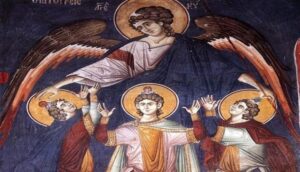The Iambic Katavasies of the Lord’s Feast of Theophany [3]
10 January 2023Ode 7
He who stilled the high flame of the furnace
Which contained the devout young men
Burnt the heads of the dragons in the river.
By the dew of the Spirit he dispels
All the turbulent gloom that comes from sin.
Interpretation:
In this ode, devoted as all 7th odes are to the three young men, Saint John the Damascan refers to two opposing phenomena: water that burns and fire that cools. The water of the Jordan burnt the heads of the dragons, i.e. the demons, at Christ’s baptism; and the high flame of Nebuchadnezzar cooled the young men instead of burning them. These two anomalies came from the all-powerful and wonder-working strength of God. As David writes: ‘You crushed the heads of the dragons on the water (Ps. 73, 13).
We, in turn, are cooled by the baptism which was inaugurated by Christ and by which he’s released us from the ancestral sin, whereas the heads of the demons are burnt and crushed. The water of the Jordan, then, has two opposing qualities: it’s burning for the demons and cooling for us.
Ode 8
Now creation is recognized as free.
Those who were in darkness have become sons of light.
The prince of darkness sighs alone.
Now let the formerly troubled generations of the nations
Bless the cause [of this transformation].
Interpretation:
Instead of dedicating this ode to the Song of the Three Young Men, as is the case with other katavasies, Saint John the Damascan ties it to the great event of Christ’s baptism at Theophany. He celebrates the joys which have been brought to us by the establishment of holy baptism: the freedom granted not only to humankind but to the whole of creation; the adoption of all of us by God as heirs; and the spiritual light which has shone in the hearts of us who ‘were in darkness’. ‘We have seen the true light, and have received the heavenly Spirit… which illumines every person who comes into the world’ (Jn. 1, 9). This happens both at holy communion and at baptism. At baptism, then, we become sons of light, that is sons of God, in accordance with his incontrovertible promise: ‘He has given them the power to become children of God’.
With Christ’s baptism, as with his resurrection, the prince of darkness, the devil, feels alone, because he’s lost all those he was keeping in the darkness of Hades. ‘You have despoiled death and were not troubled by it’. Christ has broken asunder all the centuries-old fetters and everyone is free, as is the whole of creation. Therefore let ‘all the generations of the nations’ praise the Lord, because he has become the cause of their freedom, having loosed the bonds of death and granted them immortality, paradise, provided they aren’t lured back to mortality by spiritual death, that is sin. (See Saint Gregory Palamas, Homily on the Sunday before the Nativity of Christ).
Ode 9
Megalynaria
Today the Master bows his head beneath the hand of the Forerunner
Today John baptizes the Master in the streams of the Jordan
Today the Master buried the sin of mortals in the waters
Today the Master is recognized from on high as the beloved Son
Today the Master has come to sanctify the nature of the waters
Today the Master receives baptism at the hand of the Forerunner
Glory… Magnify my soul, the dominion of the undivided Godhead in three Persons
Both now… Magnify, my soul, her who has delivered us from the curse.
How far beyond our understanding are the wonders of your birth-giving
All-pure bride, blessed Mother.
Because of you we have been granted complete salvation.
Let us then compose a worthy hymn of thanks,
Bearing it as a gift to our Benefactor.
The 9th ode is always dedicated to the Mother of God and is a hymn to our All-Holy Lady, to the woman who became a bride but remained not only pure but all-pure, a mother who remained a virgin. But the souls of all people are called upon to become brides of Christ. The mystery of the virginity of the Ever-Virgin Mother of God is truly beyond our understanding. It’s beyond the understanding not only of humankind, but also of the angels, who were astonished at it. ‘Before going into labor, before the pains came upon her, she escaped [them] and bore a male. Who has ever heard the like? Who has ever seen things like this?’ (Is. 66, 7-8). Writing about these strange wonders, Saint Basil the Great has this to say: ‘This woman is indeed a strange sign, both virgin and mother. She remained in the sanctity of her virginity while also inheriting the blessing of giving birth’ (Discourse on the Birth of Christ).
Saint John the Damascan asks how we can fail to compose a hymn of thanks, one worthy of these blessings, and offer it to our benefactor. This is how he justifies writing the katavasies for the Feast of the Theophany.
Finally, she’s called blessed because the fruit of her womb, Jesus Christ, is blessed, as Elizabeth states: ‘Blessed are you among women and blessed is the fruit of your womb’ (Luke 1, 42).







